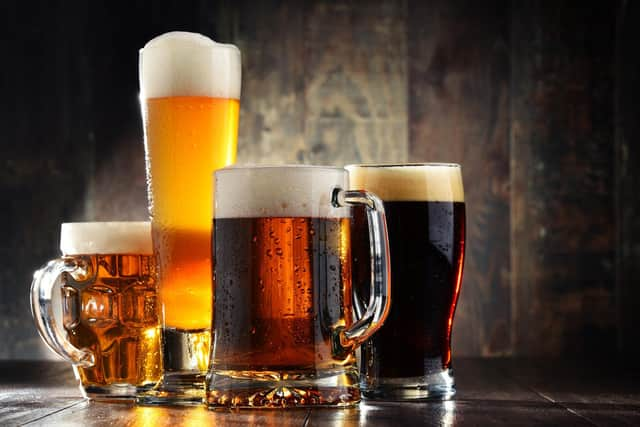Helping environment doesn’t cost the earth


While I wouldn’t want to take sides on any discussion between close friends, I’m pleased to say your friend is right.
There are so many financial benefits to doing the right thing for the environment. That’s what’s great about making decisions in a green way; your wallet will be delighted with you and so will the planet and that’s a huge win, especially in a cost of living crisis.
Advertisement
Hide AdAdvertisement
Hide AdThere’s a misnomer that going green costs extra money or that anything that’s environmentally friendly isn’t cost effective and the reality is, that couldn’t be further from the truth. Making choices with your wallet in mind is often the very best way to make sure the planet is really well taken care of too. Avoiding food waste Is the most obvious and simplest example of this. On average, a family with kids throws out £60 worth of food a week!


Heat rises, so insulating your roof saves around £415 a year off typical energy bills in a detached house, or £250 in a semi. Those aren’t amounts to be sniffed at by anyone at the moment especially with energy bills going up again by five per cent on average in January.
Studies have also found going plant based can reduce your grocery bill by around 34 percent – which if your grocery bill is £100 per week, it’ll go down by £34 to £66. That’s a huge cost saving for anyone but also means you’re helping the environment too as meat production is the single biggest cause of deforestation globally.
Studies have found working from home saves around £300 in terms of the cost of commuting and fuel – this might not be an option for everyone but it’s worth considering switching to working from home more if your employer offers that as an option. For drying clothes, heated airers cost 4p an hour to use compared to 35 pence an hour for tumble drying. Switching to LED lightbulbs reduces the energy costs of the average home by £40 per year not to mention the fact that if everyone in the UK switched to LED lighting in their home, we’d all save a collective 1.7 million tonnes of carbon emissions annually.
Advertisement
Hide AdAdvertisement
Hide AdInsulating gaps around windows – which can be done with foam tape – can save £315 annually on energy bills and stop cold draughts. If you work for a company, they can sign up to a cycle to work scheme which is a government initiative which uses salary sacrifice to get people riding to work rather than driving. The scheme can save you anywhere between £80 and £210 in the first year when buying a new bike.


These are all just a few examples and depending on how you live or how many people you have in your family there are so many more things you can do that could save you a lot of money and make a really positive contribution to the environment and climate issues. So if you get on board, you can be the one telling your friend how much money you saved by going green.
Celebrity spot
Bollywood actress Dia Mirza named on the BBC 100 women list for 2023 has spoken out about who Is to blame when it comes to climate change. Named as one of 100 inspiring and influential women around the world The 41 year old said: "The biggest climate issue is a bunch of egotistical men who refuse to change,’ while she didn’t elaborate on who she was pointing the finger at, she continued. “The polluters know their choices are killing our planet and our people, so there are really no excuses for them not to change.”
Green swap
When it comes to festive drinks, why not swap European or New World drinks for local brewers and wine makers? Not only will you be reducing the food miles your drink will have travelled but you’ll also be supporting small businesses.
Taking on the task of helping the climate in crisis
Advertisement
Hide AdAdvertisement
Hide AdIt’s that time of year when TV can turn into a sprawling wilderness of reruns, Christmas specials and top 100 lists with D list celebrities. There’s only so many times everyone can watch the Great Escape after all. But if you’re looking for some mindful watching, Channel 4s The Great Climate Fight is well worth a watch.
Mary Portas, Kevin Mcloud and Hugh Fearnley Whittingstall are all on an amazing show about how to tackle the biggest issue of our time and what can be done here in the UK.
They’re all working in their areas of expertise and it’s some really brilliant programming that will definitely get everyone who watches it talking.
The issues facing the planet are a lot more front and centre when it comes to TV shows these days and that can only be a good thing.
Advertisement
Hide AdAdvertisement
Hide AdJudging by the incredible viewing figures it gets, I’m clearly not in a minority when it comes to loving Gogglebox and I was delighted when Leeds duo Ellie and her sister Izzi were talking on the show recently about smaller turkeys for Christmas and less sprouts and both of those things they attributed to climate change following a report that was covered by BBC News and also in this column.
The BBC has a raft of stunning Sir David Attenborough programs about the beauty of our environment and the adorable wildlife to watch. My favourite is Climate Change – The Facts. Increasingly, all his nature programming looks at how hard different species across the globe have it these days due to global warming and drought.
Netflix is also packed with great shows to learn more on going green, see what the experts are saying and really get a grip of some of the things we are facing when it comes to the future.
During the Christmas period, we all hopefully have some time off to just sit in front of the telly and dig around in the leftover boxes of chocolates, but actually, some downtime and some multigenerational viewing is a great opportunity to start talking more about the new year and changes we can all make. It’s also a great opportunity to learn how different generations have experienced life and nature and how the weather and society has changed.
Advertisement
Hide AdAdvertisement
Hide AdThere’s plenty to be learned from grandparents and what they experienced – both when it comes to how different winters and summers were and also the food that was available on their tables when they were growing up and what they used to buy.
So rather than watch whatever comes on telly while everyone’s together this festive season, why not choose something everyone can learn from and something that sparks a passion for the new year too.
Fact or fiction
Healthy eco systems provide 20 percent of the mitigation that’s needed to limit global temperature rise.
Fiction, the actual figure is 37 percent of the mitigation needed to limit global warming. When eco systems are damaged, instead of storing it, they release carbon instead.